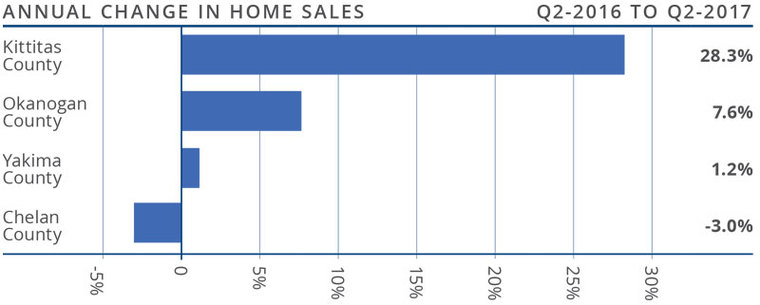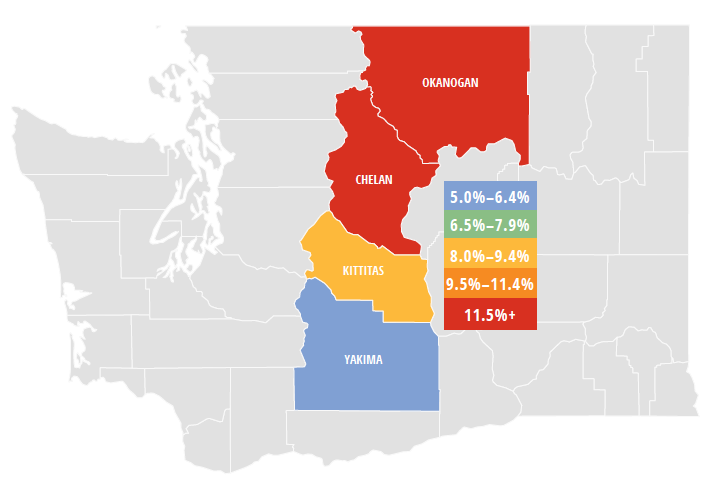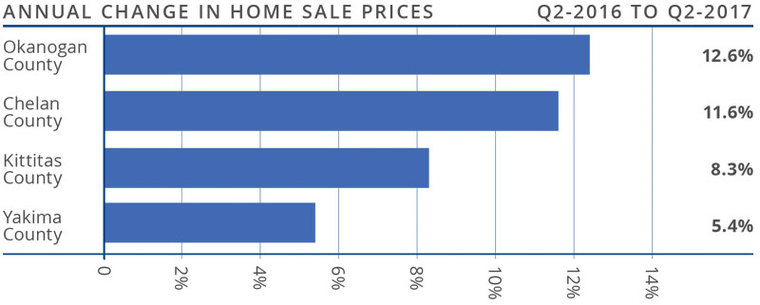ECONOMIC OVERVIEW
Though Washington State’s economy has been expanding at a rapid pace, we are seeing a slowdown as the state gets closer to full employment. Given the strong economy, I expect income growth to move markedly higher in the second half of the year. I also expect the state to add around 70,000 jobs by the end of 2017.
Like much of the rest of the state, Central Washington continues to experience modest employment growth. An additional 1,300 jobs were created between May
2016 and May 2017, which drove the unemployment rate lower (from 6.3% to 5.4%). I believe we will see continued growth in employment, leading to further declines in the unemployment rate through the duration of 2017.
HOME SALES ACTIVITY
- Home sales throughout Central Washington were mixed in the second quarter. Sales rose in three markets but dropped in one when compared to the second quarter of 2016. In total, there were 1,169 home sales in the quarter— an increase of 6.3% over the same period in 2016.
- Sales rose at the fastest rate in Kittitas County, which had an impressive 28.3% increase over the second quarter of 2016. That said, the market is a small one, so sales activity can fluctuate quite dramatically.
- The number of pending home sales— an indicator of future closings—was up across the board. As such, I expect to see regional home sales continue to rise as we move through the rest of the summer.
- The number of homes for sale in the quarter was down 14.2% compared to the second quarter of last year. The market is clearly starved of inventory, which continues to push home prices higher.

HOME PRICES
 Year-over-year, the average home price in the region rose by 9.1% to $275,979. Price growth remains robust as demand exceeds supply.
Year-over-year, the average home price in the region rose by 9.1% to $275,979. Price growth remains robust as demand exceeds supply.- Yakima and Kittitas Counties saw relatively modest price increases. The other two counties in this market reported double-digit gains.
- All counties in this report saw prices rise compared to the second quarter of 2016. Okanogan County led the way with an increase of 12.6%.
- Home prices continue to grow at above average rates due to very limited supply, but I expect the rate of appreciation to start tapering later this year or in early 2018.

DAYS ON MARKET
- Across this market, the average number of days it took to sell a home dropped by 25 days when compared to the second quarter of 2016.
- The average time it took to sell a home in the region was 98 days.
- All markets contained in this report saw the time it took to sell a home drop from the same quarter in 2016.
- Homes sold the fastest in Kittitas County, where it took an average of 49 days, which is 32 fewer days than it took to sell a home in the second quarter of last year.

CONCLUSIONS
 This speedometer reflects the state of the region’s housing market using housing inventory, price gains, home sales, interest rates, and larger economic factors. For the second quarter of 2017, the needle is well into sellers’ territory. Prices in several markets are still trending above average and inventory issues remain.
This speedometer reflects the state of the region’s housing market using housing inventory, price gains, home sales, interest rates, and larger economic factors. For the second quarter of 2017, the needle is well into sellers’ territory. Prices in several markets are still trending above average and inventory issues remain.
I anticipate that 2017 will continue favoring sellers and demand will continue to exceed supply.
 Matthew Gardner is the Chief Economist for Windermere Real Estate, specializing in residential market analysis, commercial/industrial market analysis, financial analysis, and land use and regional economics. He is the former Principal of Gardner Economics, and has over 25 years of professional experience both in the U.S. and U.K.
Matthew Gardner is the Chief Economist for Windermere Real Estate, specializing in residential market analysis, commercial/industrial market analysis, financial analysis, and land use and regional economics. He is the former Principal of Gardner Economics, and has over 25 years of professional experience both in the U.S. and U.K.
If you are in the market to buy or sell, we can connect you with an experienced agent here.
 Facebook
Facebook
 X
X
 Pinterest
Pinterest
 Copy Link
Copy Link



